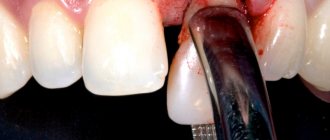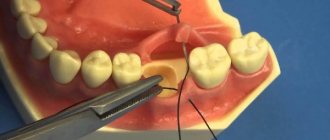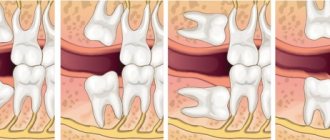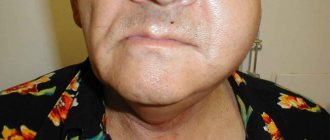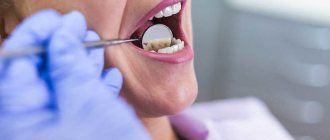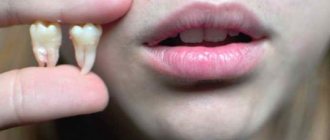Is tooth extraction allowed during pregnancy: indications and pitfalls
In the process of planning a pregnancy, it is important for a woman to take her health seriously, and for this it is necessary to undergo a preventive examination from specialized doctors, including a dentist. However, there are often cases when the need for dental care arises directly during pregnancy. For this reason, many women who are in an “interesting” situation have a logical question: is it possible to remove teeth during pregnancy and how safe is it?
Is it possible to have teeth removed during pregnancy?
Reasons for tooth extraction
Indications for surgical intervention in dental treatment in pregnant women are quite limited:
- acute long-term pain;
- injury to the jaw or individual tooth;
- malignant formations at the root neck and dental cyst;
- purulent inflammation.
Acute long-term pain or purulent inflammation are the reasons why tooth extraction will have to be performed
In addition to severe pain and discomfort while eating, these problems cause a lot of harm to the woman’s body and the development of the fetus. Inflammation from one tooth can easily spread to the rest, and pathogenic microorganisms enter the bloodstream and spread throughout the circulatory system. In addition, pain when chewing prevents a woman from eating properly, which means that the child gets fewer nutrients. Well, the stress that the expectant mother experiences does not benefit the baby in any way.
Read also: Is it possible to insert teeth during pregnancy?
Toothache negatively affects the health of the fetus
But all this does not apply to wisdom teeth. Their removal is a complex process with a high risk of complications, including inflammatory processes. They are treated only with antibiotics, which does not bode well for pregnant women, and therefore wisdom teeth are not pulled out for pregnant women. In the event of severe pain, the only acceptable alternative is treatment, even with a temporary effect. The main thing is to wait for a safe period when the woman gives birth and regains her strength.
Why do teeth deteriorate after conception?
A pregnant woman is obliged to pay increased attention and responsibility to the health of her teeth. The fact is that during this period certain changes begin to occur in the body, which, unfortunately, have a very deplorable effect on the condition of the entire jaw system:
- weakening of the immune system,
- dramatic changes in hormonal levels,
- lack of vitamins and minerals, due to the “departure” of most of them for the formation of the fetus and the development of the baby’s organs,
- acute deficiency of calcium in the body, which is the main element of bone tissue.
A lack of minerals and vitamins can have a negative impact on the condition of a pregnant woman’s teeth.
Such phenomena can provoke the development of inflammation and carious lesions. If the first symptoms of dental diseases appear, you should immediately seek professional help from a dentist.
Treatment and removal during pregnancy - pros and cons
If the diseased tooth does not bother you much, then it is better to postpone its extraction until after childbirth. But when the question arises about severe discomfort or even pain, there can be only one solution - to immediately remove the causative element. It is worth immediately indicating that the most preferable period for treatment and removal is the second trimester of pregnancy. Today, the procedure is carried out with maximum comfort and safety for the patient, using modern harmless anesthetics and gentle extraction methods, for example, using a laser.
Indications for the procedure
We found out whether teeth are removed during pregnancy and whether it is even possible to carry out such a procedure at this time. Obviously, there needs to be a compelling reason for its appointment. This is a surgical operation, which in the situation under consideration is performed only if there are strict indications:
- infection of surrounding tissues: usually this phenomenon is observed with the rapid development of carious lesions and its complications - pulpitis, periodontitis. That is, when it is not possible to maintain one, and inflammation progresses very quickly,
- severe damage down to the root,
- malignant neoplasms or cysts: in this case, not only removal, but also surgical intervention to remove the tumor may be required,
- unexpected growth of wisdom teeth, which causes damage to its “neighbors” and leads to acute inflammatory processes,
- advanced gum disease: the presence of a serious pathology, which again progresses very quickly, while drug therapy does not produce positive results.
Pulpitis may be an indication for tooth extraction
. Due to painful sensations in the oral cavity, a pregnant woman begins to become very nervous and worried. In addition, this inevitably affects the diet of the expectant mother, which is why the baby involuntarily suffers. Therefore, the issue of dental treatment during pregnancy must be resolved.
Symptoms of pathological eruption of wisdom teeth during pregnancy
When a wisdom tooth is cut during pregnancy, the symptomatic picture may differ slightly from other manifestations of dental pathology, for example, caries or pulpitis. At first, a woman may feel unwell and have a fever, and only after a few days it will become obvious that the culprit is a wisdom tooth.
You can recognize increased growth of wisdom teeth during gestation by the following general symptoms:
- soreness, twitching or pressure in the gums, especially at night;
- when eating, sudden discomfort appears when there is strong pressure on the wisdom tooth;
- causeless increase in body temperature, often to high levels;
- enlargement and tenderness of the cervical lymph nodes;
- an unpleasant putrid odor from the oral cavity that cannot be eliminated by regular brushing of the teeth;
- swelling and severe redness of the mouth, including the larynx;
- hoarseness, frequent hiccups;
- pain radiating to the auricle, temple, jaw;
- painful sensations during swallowing;
- severe headache pain, concentrated on one side, often impulsive.
Important! At the first signs of toothache, there is no need to panic. A timely visit to the doctor will solve the problem without consequences for mother and baby.
How pregnancy duration affects – choosing a safe period for the procedure
Often, the harm from inaction is much more serious than from a standard dental procedure, which is an extraction. If, during a routine examination, a specialist discovered obvious indications for this procedure, then before removing a diseased tooth, it is necessary to obtain appropriate permission from a gynecologist and therapist.
So, let's talk in more detail about the difficulties and nuances associated with the extraction procedure during different periods of pregnancy:
- first trimester: the first ten weeks are especially important for the healthy development of the fetus. Strong worries about the upcoming treatment, anesthesia and x-ray examination - all this together may not have the most positive effect on the process of development and formation of the child’s basic body systems. On the other hand, severe pain can provoke uterine contractions and hypertonicity, and besides, the risk of spreading infection and developing complications increases too much. In dental practice, it is not uncommon for patients to undergo treatment in the early stages, not knowing about their pregnancy. If the situation is urgent, the doctor will perform the procedure. However, dentists agree that it is better to do everything possible to postpone the removal at least until the last month of the trimester,
- second trimester: at this time the embryo transforms into a full-fledged fetus with sufficiently developed internal organs, including the heart. Now the mother’s stress will not affect the child so much, so this trimester is the optimal time to schedule extraction of the diseased element,
- third trimester: at such a long period, such treatment methods are extremely undesirable, which is mainly due to the risk of uterine contractions and the onset of premature labor.
The second trimester is the optimal time to prescribe extraction of the diseased element.
The first trimester involves the formation of the internal organs of the fetus and the placental barrier, so it is better to postpone medical procedures. In the third trimester, the risk of premature birth increases too much.
“When I was pregnant, I had a tooth removed, though not a wisdom tooth, but still. I think it was week 17. But my dentist is real gold! He also managed to clean three channels so that nothing hurt at all afterwards. After removal, the hole ached for about an hour, and then everything went away. I don’t want to force my opinion on anyone, this is just my personal experience. I always adhere to the principle that the most important thing is the doctor, his experience and professional skills. I was very lucky in this!”
Irishka, 28 years old, fragment from correspondence on the forum
“And it just so happened that in the fifth month my teeth literally began to crumble. Then I was very scared, I kept putting off going to the dentist - I was afraid for the child. In short, I delayed it out of my stupidity. As a result, there was a need for tooth extraction, but I was forbidden to perform the operation. In short, I suffered then. As a result, the dentist in a private clinic was already removing the remaining teeth and was very angry that I had not come earlier. By the way, they gave me good anesthesia; nothing hurt at all, neither during the removal nor afterwards. The temperature did not rise, and everything was fine with the baby.”
Marina A., Tula, fragment from correspondence on the forum
Read our article about how to properly care for your oral cavity after tooth extraction >>>
Has anyone had their wisdom teeth removed during pregnancy?
Hello everyone, I am writing because I am desperate. and I don’t know what to do. I am now 33 weeks pregnant, my white blood cells are elevated. The therapist and G. at the consultation say that it is necessary to remove the teeth, since there are “problematic” ones and due to caries there may be such indicators. My cavity has been sanitized, except for my “wisdom” teeth, which the dental surgeon recommends removing (teeth with caries are not advisable to treat). I already seem to be determined to have it removed, and the doctors advise, they say that you can avoid problems with the child’s health in the future, that due to a dental infection, the baby may have pneumonia when she is born, dysbacteriosis, etc. etc., so yesterday I read on the net that it is not recommended to remove wisdom teeth during pregnancy, that there may be inflammation, which can be controlled with antibiotics, and that the temperature may rise to 38. In general, I am confused and in despair . Should I leave everything as it is or should I delete it?
Woman.ru experts
Find out the opinion of an expert on your topic
Natalya Evgenievna Pokhodilova
Psychologist, Kinesiologist Online consultant. Specialist from the site b17.ru
Kostitsyna Evgenia Andreevna
Psychologist, Cognitive Behavioral Therapist. Specialist from the site b17.ru
Daria Ivanova
Psychologist, Gestalt therapist. Specialist from the site b17.ru
Yulia Talantseva
Psychologist, existential therapist. Specialist from the site b17.ru
Starostina Lyudmila Vasilievna
Psychologist, Practical psychologist. Specialist from the site b17.ru
Muratova Anna Eduardovna
Psychologist, Online consultant. Specialist from the site b17.ru
Shiyan Olga Vasilievna
Psychologist, Psychologist-consultant. Specialist from the site b17.ru
Kupchenko Victoria Evgenievna
Psychologist. Specialist from the site b17.ru
Victoria Nikolaevna Mitkina
Psychologist, Clinical psychologist. Specialist from the site b17.ru
Raushkina Alla Vladimirovna
Psychologist. Specialist from the site b17.ru
[3020386245] - October 30, 2012, 1:12 pm
I had it removed at 4 months. The dentist said that you can remove it from the 4th to the 8th month. They give you a special painkiller. One bad thing: no good painkillers or antibiotics are allowed after that. As the doctor said, you’ll have to endure it. After the removal of wisdom teeth, many (and I had this) for another half a month, half my jaw and my teeth hurt. The doctor says that the teeth will fall into place, because the wisdom tooth is, as it were, superfluous, supporting the rest of the teeth. I suffered for these two weeks, I adjusted the cotton wool with ice-caine. But I need to pull it out, but Then, when breastfeeding, no anesthesia is allowed at all.
[3106319772] - October 30, 2012, 1:34 pm
ordinary caries does not affect leukocytes. and if you have purulent inflammation, then remove it. And then after taking antibiotics.
[979873745] – October 30, 2012, 1:39 pm
I deleted it. The doctor said that the painkiller is of a new generation and will not cause harm. The only difficulty was that it was impossible to take an x-ray, so they tore it without seeing the roots. Everything went well. She gave birth to a healthy boy.
[2538060595] – October 30, 2012, 1:41 pm
If it hurts, try removing it. Or cure. A good dentist never advises removing them right away, even if we are talking about eights. Regarding the connection with health, yes, caries is harmful, but in order to cause pneumonia and dysbacteriosis in a child. listen to our doctors more. Sometimes they don’t pay attention to what’s important and start focusing on trifles. The main thing is don't worry. My wisdom teeth did not bother anyone, although caries was discovered in them during pregnancy.
Read also: Is it possible for pregnant women to have their teeth pulled out?
[3106319772] - October 30, 2012, 1:48 pm
I would be like a dentist. I would not recommend removing a wisdom tooth at this time unless there is an urgent need. Removal is difficult. there may be complications. Do you need it now?
[804538690] - October 30, 2012, 1:59 pm
I had it removed during breastfeeding, then I cried for two weeks - I couldn’t take painkillers, and my entire jaw was swollen and painful. The temperature was 37.7. And once a doctor treated such a tooth for me - she filled it up, didn’t treat the canals, but put it there. Formalin or something. Looks like it's been preserved. Although such treatment does not last long, the filling lasted two years, and then the tooth was pulled out.
[544269024] - October 30, 2012, 2:11 pm
What is the need to delete now? Are you being scammed? Would you like to go and have a consultation? Of course, it is better to remove it after childbirth.
[1058606287] - October 30, 2012, 2:17 pm
Is treatment impractical or no longer possible? If it is impossible, then yes, you need to delete it. If there is even the slightest opportunity to cure your teeth, it is better to cure them and put fillings.
[957917994] – October 30, 2012, 4:18 pm
I removed the zm both during pregnancy for 8 months and during pregnancy. It didn’t affect the child in any way; we have special anesthesia for people like that. It hurt for about a week, but it was tolerable. You can take Panadol for pain.
[1491417289] – October 30, 2012, 7:45 pm
Is it possible to heal at least temporarily with a simple filling? And then after childbirth, if necessary, remove it if there is no way around it.
[1122809615] – October 31, 2012, 3:49 pm
Mia, please tell me.. I’m 4 weeks pregnant. I need to have 3 teeth removed (they don’t bother me)... but for me any trip to the dentist is terrible! stress, up to fainting and severe drop in blood pressure. how to proceed? wait? I'm very afraid of the possibility of miscarriage
[4050881331] – November 6, 2012, 2:03 pm
Something really scared you. If your wisdom teeth don’t hurt, why pull them out now? I spent my entire pregnancy with wisdom teeth. I didn’t even know that they were recommended to be removed. And nothing bad happened from this. You better consult several doctors. And then make decisions. Come to DentalFantasy. There are good specialists there. In addition, they will not advise you to remove teeth just because of money alone, I tested it on myself))).
[3619161760] - April 17, 2013, 03:20
I want to share my impression of having teeth removed. I had the first 8 teeth removed for two weeks, and the second one was in the seventh month, that is, today, I was given pain relief, everything went fine, but the worst condition begins after, here I am sitting with a tablet at 3 am and I’m writing to you because it’s simply impossible to fall asleep from the hellish pain, it feels like half my face is missing, swallowing is very painful, everything aches and hurts, taking into account the fact that I drank children’s ponadol and 2 tablets of no-spa, so I’m sitting and looking for what you can still do it. Although the first pregnancy walked like an elephant, nothing bothered me. I really hope that this process goes differently for someone else, hang in there girls.
[2277561832] - April 21, 2013, 2:08 pm
Nata, as I understand you, had it removed at 15 weeks because she couldn’t stand it any longer, the removal itself happened quite quickly, but when the anesthesia began to wear off. The pain has intensified 100 times (((. today is the second day, if not for the temperature of 37 and 7, then, in principle, everything is fine.
[3597713073] – October 5, 2013, 19:00
My tooth hurt terribly. I suffered for two months. I rinsed it with baking soda and brushed my teeth every half hour. There was no treatment for it.. just removal (I couldn’t stand the pain anymore, I went to the clinic.. actually at 22 weeks of pregnancy they removed it.. now it’s like a week without pain.. I can’t even believe it !
[3546874729] - October 6, 2013, 00:11
I’m 16 weeks pregnant.. 2 teeth hurt.. 6 and 8.. the bad one needs to be removed.. 6 is in the fillings but it hurts more.. I want to remove the wise one. but I’ve been reading all sorts of things and don’t know what to do.. then bad teeth have an effect on the child’s health. But on the other hand, great pain from vomiting is also bad.. what to do?? what’s best for both of us.
[3087852319] – October 17, 2013, 9:54 pm
Huge problem, I'm going to the dentist and I need to have my wisdom teeth and 7 removed, yesterday I took a test and it was positive! What should I do? It hurts a lot.
[802544739] – October 31, 2013, 9:04 pm
I have the same problem, my wisdom tooth hurts, today I went to the dentist and put some medicine in my tooth, they decided not to remove it yet. I read a lot that it is not advisable to remove it. So it hurts a little, I rinse with chamomile)))) hang in there
[716283326] – November 4, 2013, 11:45 pm
Hello moms! I'm 32 weeks pregnant. My wisdom teeth hurt. There is no treatment, only removal. I can't sleep at night because of the pain. For me, going to the dentist is like going to a firing squad. It's almost 6 o'clock in the morning. I've been searching the Internet for two hours now. I thought about going to the dentist in the morning. But I read that it is better to postpone the removal. How to be? What should I do?
[3172523204] – November 13, 2013, 09:24
I had it removed at 4 months. The dentist said that you can remove it from the 4th to the 8th month. They give you a special painkiller. One bad thing: no good painkillers or antibiotics are allowed after that. As the doctor said, you’ll have to endure it. After the removal of wisdom teeth, many (and I had this) for another half a month, half my jaw and my teeth hurt. The doctor says that the teeth will fall into place, because the wisdom tooth is, as it were, superfluous, supporting the rest of the teeth. I suffered for these two weeks, I adjusted the cotton wool with ice-caine. But I need to pull it out, but Then, when breastfeeding, no anesthesia is allowed at all.
[2904595471] – November 26, 2013, 2:51 pm
I had my wisdom teeth removed at 39 weeks. In dentistry, they gave me a referral to the department of maxillofacial surgery at the 1st medical center, where, after consultation with an obstetrician-gynecologist, they gave me good anesthesia and pulled it out without any pain. Paracetamol was allowed as a pain reliever afterwards. And, by the way, the obstetrician-gynecologist told me that the source of inflammation in the tooth is much more dangerous than the meager dose of anesthesia that I was injected with.
[1375375572] – January 6, 2014, 1:35 pm
I had my wisdom tooth removed at 25 weeks of pregnancy. The doctors said there was inflammation there, it was useless to treat, they made anesthesia specifically for pregnant women, but I don’t remember the name. If there is inflammation, you cannot leave it. And consult with a gynecologist and dentist, they don’t give bad advice)))
[1400814290] – January 15, 2014, 11:56 pm
Hello everyone, I’m 15 weeks old, I had my 8 tooth removed 4 hours ago, half of my face hurts, my temperature is 37.5, but it’s warming to think that this tooth will no longer bother me and the baby and I’ll be able to sleep at night instead of crying in pain. Good luck to all
Read also: Is it possible for pregnant women to have their teeth pulled out under anesthesia?
[2891514371] – January 30, 2014, 09:48
I am 21 weeks old and went to treat root caries. The doctor looked and said that my gums were bad because of the wisdom tooth. When I eat, for example, there is nothing for him to wear off, and he cuts my gum gradually, I told him to remove this tooth first so that it doesn’t get worse later. It doesn't hurt, but sometimes the gums ache a little because of it. I do not know what to do.
[1636489219] – January 30, 2014, 10:55 pm
Girls, what should I do? I’ve been dying from pain for three days now. I don’t sleep at all, by night everything goes cold and the temperature rises. Today I went to the dentist with acute pain, he said the period is short, 11 weeks, he will not take such responsibility upon himself, since he does not know my pain threshold, a miscarriage may occur. He said it’s no big deal and it could be worse and sent me home to rinse with soda. I’m tormented by a wisdom tooth, it’s been creeping in for several years, half of it has come out, and the other half is covered by a hood, which is now inflamed, followed by a lymph node, throat, nose and today the ear, temperature 37.7. I’m in shock. what to do? I should go to another doctor, maybe he can at least move this hood back for me and clean it, what if there is suppuration there?? This pain won’t go away on its own??
[911306389] – February 4, 2014, 2:33 pm
Girls, what should I do? I’ve been dying from pain for three days now. I don’t sleep at all, by night everything goes cold and the temperature rises. Today I went to the dentist with acute pain, he said the period is short, 11 weeks, he will not take such responsibility upon himself, since he does not know my pain threshold, a miscarriage may occur. He said it’s no big deal and it could be worse and sent me home to rinse with soda. I’m tormented by a wisdom tooth, it’s been creeping in for several years, half of it has come out, and the other half is covered by a hood, which is now inflamed, followed by a lymph node, throat, nose and today the ear, temperature 37.7. I’m in shock. what to do? I should go to another doctor, maybe he can at least move this hood back for me and clean it, what if there is suppuration there?? This pain won’t go away on its own??
I had the same thing during your period, the tooth did not fully erupt, there was a hood over it and severe inflammation of the gums, the doctor dissuaded me from removing it, cleaned it with something and prescribed rinsing with a solution of chlorhexidine and herbs (sage, chamomile, St. John's wort), the pain was hellish, but after 2-3 days of rinsing it went away. After 2 months, this horror happened again, inflammation, suppuration, I’ve been suffering for 3 days, today I’m going to have it removed, I hope there will be no complications.
What is the safest time for removal?
As we have already explained above, in fact, there is no safe period for tooth extraction. Because even if anesthesia can be used in the second trimester, then after this operation you will need to rinse the mouth with antiseptic solutions (not all of them are allowed), and you will need to take certain medications. What if a complication develops? After all, then even stronger therapy will be required! So it’s better to hold off on deleting it. But if the indications are urgent, then any period will not be a limitation, because a bad tooth means pain, stress and, of course, an acute inflammatory process, which is also dangerous for the fetus.
So should pregnant women have their teeth removed?
This issue does not lose its relevance among women expecting a child. Pregnancy is a period during which the female body has increased vulnerability, which leads to disruption of calcium metabolism and subsequent deformation of the enamel, which is a serious indication for treatment, and sometimes even tooth extraction procedures. Of course, being in the dentist's chair is a real stress, aggravated by the mental characteristics of the expectant mother. But constant pain will manifest itself more unpleasantly on the physical and emotional state of the patient and the child in the womb. In this case, a negative factor can be attributed to the presence of a permanent focus of infection, which can include any lesion of varying severity.
We can talk about the availability of a wide range of drugs that have passed all the necessary tests and can be used during the treatment of a pregnant woman. The special composition of certain medications allows them to be absorbed only by the oral cavity, without penetrating into the bloodstream, and therefore they do not harm the child. In case of severe pain and confirmation of the indication for tooth extraction, you should contact competent specialists who take into account the specifics of treating patients who are expecting a child, so that the painkiller can be properly selected.
Read also: Is anesthesia given during dental treatment for pregnant women?
How is the procedure performed?
The procedure will be performed by a dental surgeon. Before this, he needs to study the results of the X-ray examination. However, if the patient is in position and the clinical picture is obvious, this stage can be avoided so as not to further jeopardize the process of fetal formation. But you shouldn’t worry if you can’t do without an image - today clinics and diagnostic centers use modern high-precision equipment to minimize the negative impact of x-rays on the human body.
An examination is required before the procedure.
Extractions are carried out in any case with the use of painkillers. Currently, for this purpose, the most gentle drugs are used that are safe for the health of both mother and baby. After administering the anesthetic, the surgeon carries out the procedure according to the standard protocol - he grabs the causative element with special forceps, sharply twists it and carefully removes it. After treatment, the patient will be given detailed recommendations for oral care.
Means for healing the hole, approved for pregnant women
It is recommended to refrain from eating for about 3 hours. Immediately after treatment, you should not heat the sore spot - this can only intensify postoperative symptoms and even provoke inflammation. Rinsing your mouth is also contraindicated, since this can damage the blood clot, which is a kind of barrier that protects the open wound from infection.
As for medications, pregnant patients are usually prescribed Paracetamol for pain (0.5 g is the maximum single dosage) and the antiseptic Amoxiclav. A chamomile decoction for mouth rinsing will help relieve signs of inflammation and provide additional disinfection. Before using it, be sure to consult a specialist.
Patients are often prescribed Amoxiclav
Removal Features
During pregnancy, a wisdom tooth is removed using a special anesthesia that does not penetrate the placenta, and the woman does not feel pain. After the procedure, the doctor will explain how to care for the wound and how to rinse it. You can take medications for pain relief only with the permission of a doctor; in very rare cases, expectant mothers are allowed to take Tempalgin or Paracetamol.
The tooth will not be removed under general anesthesia - this can lead to oxygen starvation of the child. It is still better to avoid radiography during pregnancy; a complete picture of the condition of the tooth can be obtained using a radiovisiograph - a modern electronic device.
The optimal time for removing a wisdom tooth in a pregnant woman is considered to be the second trimester; such an operation cannot be performed in the early and late stages of pregnancy.
Removing a tooth is not always easy. The doctor may need to make an incision in the gum, drill into the bone tissue, and remove it using special tools. This is a rather traumatic procedure, and after it the temperature may rise, aching pain will bother you, and the wound itself will take a long time to heal.
This is what the removal process looks like.
Due to the fact that the wisdom tooth is located quite far away, it is problematic to care for the site of damage after removal; inflammatory processes and suppuration can occur in the wound, and this is extremely dangerous for the child, because in case of inflammation, antibiotics will be prescribed. Therefore, if the doctor does not insist on removal, then it is better not to remove teeth during pregnancy.
From all of the above, we can conclude that in the presence of acute pain or an inflammatory process, it is worth removing the tooth immediately, but if it is possible to delay the period a little until the second trimester or until childbirth, then it is better to wait.
Well, if the tooth doesn’t bother you much and there is no inflammation, then it is advisable to leave the removal until a more suitable period after childbirth.
Operation stages
After the doctor has collected medical history (side diseases, possible allergic reactions) and examined an x-ray of the affected area of the gum, he begins the operation.
- First, the doctor administers anesthesia and waits 5 to 10 minutes for the drug to take effect.
- The surgeon uses a special tool to separate the gum from the tooth so as not to unnecessarily injure the soft tissue during the removal .
- Next, he places forceps on the top of the tooth and loosens it to destroy the ligaments that attach the tooth to the bone .
- If the tooth cannot be removed from the gum by simply loosening it , the doctor will have to cut the gum or crush the tooth to remove it piece by piece .
- Then the tooth and all its fragments removed from the socket.
- The doctor treats the hole with an antiseptic , puts anti-inflammatory agent in it, and in cases of difficult removal places on the gum .
What anesthesia can be used for pregnant women?
During pregnancy, it is allowed to use local anesthesia as a measure of pain relief. The doctor chooses the drug based on safety for the woman and the unborn child. Some modern anesthetics, developed specifically for pregnant women, do not contain vasoconstrictors, do not penetrate the placental barrier and therefore do not have a negative effect on the fetus, allowing you to effectively anesthetize the desired area of the gums. The use of drugs containing adrenaline during pregnancy is prohibited.
This is interesting: Perforation of the maxillary sinus during tooth extraction: features and methods of determination
Approved anesthetics include:
- Ultracaine. When treating an expectant mother, a safe concentration of the active substance is selected.
- Ubistezin. Does not pass through the placental barrier, safe for the baby and mother.
- Novocaine. It is used as a spray; saliva should not be swallowed.
General anesthesia has a detrimental effect on the child’s nervous system and is used in exceptional cases that threaten the life of the mother. In dentistry, such situations include the removal of malignant tumors in the oral cavity.
What can a doctor do to overcome fear of surgery?
Everyone is afraid of dentists, and pregnant women panic when they hear that they need to sanitize their oral cavity. To eliminate anxiety and relieve stress, doctors do everything to make wisdom tooth removal during pregnancy as comfortable as possible for the patient and the pregnant woman. After all, if the mother is excited, then the child also experiences discomfort.
To alleviate the condition, the dentist suggests using a sedation procedure. This manipulation is very often used by relatively young children who are terrified of having their teeth treated. To prevent the first visit to the dentist from becoming the last in a child’s life, doctors use a special anti-stress procedure.
The essence of sedation is that nitric oxide is supplied to the respiratory organs through a mask. Laughing gas does not harm health, since it is found in large quantities in the atmospheric air, and we inhale it every minute. This procedure helps to relax and calm the nervous system.
What should you do after surgery?
After tooth extraction, an open wound remains in the gum, which requires care to avoid infection. The surgical intervention will be completed with minimal risk if you follow a number of certain rules.
Actions after removal:
- It is forbidden to eat for three hours;
- It is not recommended to rinse your mouth;
- It is forbidden to warm the sore spot.
During the first meal after surgery, you must ensure that food particles do not get into the wound. Drink fluids and brush your teeth carefully so as not to rinse out the formed blood clot, which is necessary for proper healing. In case of pain or fever, the only painkiller and antipyretic drug approved for use during pregnancy is Paracetamol.
Means for healing the hole, approved for pregnant women
It is recommended to refrain from eating for about 3 hours. Immediately after treatment, you should not heat the sore spot - this can only intensify postoperative symptoms and even provoke inflammation. Rinsing your mouth is also contraindicated, since this can damage the blood clot, which is a kind of barrier that protects the open wound from infection.
As for medications, pregnant patients are usually prescribed Paracetamol for pain (0.5 g is the maximum single dosage) and the antiseptic Amoxiclav. A chamomile decoction for mouth rinsing will help relieve signs of inflammation and provide additional disinfection. Before using it, be sure to consult a specialist.
Patients are often prescribed Amoxiclav
How to relieve pain
If the doctor does not see the need to remove a tooth during pregnancy and recommends waiting for childbirth. How can you relieve toothache for a woman carrying a baby?
If the discomfort is mild, then it is better to do without the use of drugs, but if the pain intensifies and becomes prolonged, then tolerating it means exposing both the woman and the baby to stress.
The pregnant body often tolerates the following analgesics without consequences for both the baby and the mother:
- Ribal;
- Nurofen;
- Papaverine;
- Paracetamol;
- No-shpa;
- Ibuprofen.
But not always. Be sure to consult your doctor before using them!
By the way, the safest remedy of all of the above is Paracetamol, it is recommended by the World Health Organization. The absence of its adverse effects on the fetus has already been proven.
Traditional medicine
There are cases when doctors categorically prohibit a pregnant woman from taking analgesics, even Paracetamol. All that remains is traditional medicine. Despite the fact that medicinal herbs have very few side effects and contraindications, they should not be taken without consulting a doctor, especially for pregnant women.
Some herbs can cause allergic reactions or even trigger premature labor. Always consult your doctor before using them!
The most effective methods:
- One of the safest remedies is onion juice dissolved in salt water. They need to soak a cotton ball and place it on the sore tooth.
- You can make a slightly warm compress (you can’t apply a hot one so as not to cause inflammation) by dissolving a little propolis in dental drops.
- Grind several branches of cloves in a coffee grinder or buy a tincture of this plant at the pharmacy, dilute it with water, put it in your mouth and hold it near the sore tooth for several minutes.
- Even acute pain can be eliminated with a 1% hydrogen peroxide solution.
- Rinsing with a soda-saline solution relieves pain well.
- It is safe to treat the oral cavity with a decoction of onion peels; after boiling, let it brew for 12 hours.
It is important to remember that for any toothache, it is forbidden to apply heating pads to the jaw, make hot compresses or rinse with hot solutions - this can only worsen the situation and an inflammatory process can begin.
Nuances and features of the procedure during pregnancy
If, after carrying out all the necessary diagnostic measures, the dentist nevertheless comes to the conclusion that urgent extraction is necessary, then the procedure will be carried out with local anesthesia. The operation usually proceeds quickly and without complications. In this case, the expectant mother must strictly follow all the instructions of the attending physician and carefully monitor her condition after the procedure.
How safe is X-ray diagnostics?
Usually, before removal, the doctor prescribes x-ray diagnostics. Pregnant patients most often have to undergo this procedure using a visiograph - this is a modern device that is characterized by a targeted effect and minimal negative impact of x-rays on the body. As a result, the doctor receives an informative image, on the basis of which he can make a final verdict regarding the need for removal.
A visiograph will help you take a targeted photo with minimal health risks
Anesthesia and medications
Many expectant mothers are concerned about the question of what kind of anesthesia pregnant women can use. In this case, teeth should be removed with an injection of local anesthesia only - the procedure is not performed under anesthesia. Modern pharmacology offers effective and safe drugs for this category of patients with the following properties:
- the products do not cross the placental barrier, which means that their active ingredients cannot affect the fetus in any way,
- do not contain vasoconstrictors (to be more precise, epiniphrine).
Teeth should be removed with an injection of local anesthesia only.
For this purpose, today drugs such as Ultracain, Ubistezin and Novocain are used - the latter is used exclusively in the form of a spray and requires mandatory spitting of saliva. With such an injection, pulling out a tooth does not hurt at all, so there is nothing to be afraid of.
Possible complications
In any case, the procedure is fraught with certain complications, which, however, usually develop against the background of mistakes made by the doctor or the patient’s failure to comply with the dentist’s instructions. Such negative manifestations can be divided into early and late. The first category includes complications that occur during or immediately after the procedure:
- jaw injury,
- fainting,
- injury to the maxillary sinuses,
- leaving fragments in the gum tissues,
- damage to neighboring units,
- bleeding, hematoma formation.
This is what inflammation of the socket looks like after tooth extraction.
However, certain problems may arise some time after extraction.
These manifestations include alveolitis, expressed by inflammation of the socket, as well as neuritis, which is characterized by the development of inflammatory processes in peripheral nerve cells. The sooner you contact a specialist if such phenomena develop, the easier and faster they can be eliminated without consequences.
Can pregnant women have their teeth pulled out under anesthesia?
Of course, few people would agree to pull teeth without pain relief. And the doctor will not subject a pregnant woman to such stress. Therefore, the question “is it possible for pregnant women to have their teeth pulled out under anesthesia? receives a positive response. But only local anesthesia is used. The dentist makes the choice of medication based on the safety of the fetus and the health of the mother.
Modern anesthetics that have been specially developed for patients in the following position:
- are not able to penetrate the placental barrier;
- do not have a vasoconstrictor effect;
- do not have a negative effect on the fetus;
- have a good analgesic effect in a specific area of the oral cavity.
It should be remembered that all drugs based on adrenaline are completely prohibited.
Removal of a tooth nerve during pregnancy: how justified is it?
We figured out whether pregnant women have their teeth removed, and now let’s talk about the possibility of removing a nerve. First of all, it should be noted that this is only a last resort measure that is used when there are no other options to solve the problem. Depulpation is indicated in situations where the neurovascular bundle, called the pulp, is 90% affected1. In other cases, the doctor will first do everything possible to cure pulpitis by treating and filling the root canals. If it was not possible to save the nerve, the depulpation procedure cannot be avoided.
Today there are safe methods for nerve removal
Just some time ago, the process of killing the pulp involved the application of arsenic followed by the installation of a temporary filling. A few days later, the paste was removed, the nerve was pulled out, after which a permanent filling was fixed. Because arsenic has an extremely negative effect on the body, women during pregnancy underwent this procedure only in extremely rare cases. Today, to “kill” the nerve, modern safe medications are used, making the procedure less painful and possible for use during pregnancy.
Removal of wisdom teeth in girls in the “position” - risks and complications
According to statistics, wisdom teeth, also known as third molars or “eights,” most often begin to emerge between the ages of 18 and 252. And this is exactly the age when young people are going to have their first or second child. It turns out that the appearance of third molars in pregnant women is not such a rare occurrence.
Important! Regarding whether wisdom teeth are pulled out during pregnancy, it should be noted that such operations are not performed during this period. The risk of a sharp deterioration in health after surgery is too great. Ideally, it is better to postpone the procedure. It is important for the expectant mother to understand that the state of her body inevitably affects the health of the child.
On the other hand, many reputable experts hold an alternative point of view. For example, E. Groves, a professor at Columbia Dental College and a practicing dental surgeon, explains his position on this matter as follows: severe pain in the area of the wisdom tooth indicates that pathological processes arose during its eruption. If you simply endure this pain, you can cause much more serious harm to two organisms at once. As a result, there is a risk of developing an infection, which can lead to the formation of a cyst, inflammation, fistula and other serious consequences. And then apply logic: if no measures are taken, harmful bacteria will penetrate into the blood, and here problems will not be avoided. In such cases, the question of the advisability of tooth extraction does not arise at all.
If there is no alternative method, then the wisdom tooth should be removed
How to Avoid Extraction
After registration, a pregnant woman will have to undergo a routine examination by a dentist. During this visit, it is important to obtain the most complete and detailed information about the current state of the oral cavity, and if any dental problems are diagnosed, they will need to be promptly corrected after 14 weeks.
The patient should also ask the doctor for detailed advice on oral care while pregnant. After conception, some changes occur in the composition of saliva, a lack of calcium in the body is often observed, and pathogenic microflora develops many times faster in the absence of the proper level of oral hygiene. All this creates fertile ground for the spread of bacteria and the development of carious lesions, so oral health during this period should be approached especially carefully and responsibly. The expectant mother needs to balance her diet and ensure a sufficient supply of vitamins and minerals to the body. There is still an opinion among people that dental treatment during pregnancy is extremely dangerous. This belief has long been outdated, because today modern dentistry offers the most gentle procedures, as well as high-quality and safe anesthetics that do not pose a threat to the health of the expectant mother and child.
- Lukinykh, L.M. Pulpitis (clinic, diagnosis, treatment), 2002.
- According to statistics from the World Health Organization (WHO).
Is anesthesia safe for the fetus?
Stay up to date! Treatment of teeth and their removal during pregnancy is completely painless.
This is explained by the fact that in order to prevent the onset of pain, the dentist necessarily introduce a safe anesthetic that cannot harm either the expectant mother or her child.
The use of local anesthetics is permitted during pregnancy, since the active substances of the drug are absorbed only into the gums and do not reach the child.
In addition,
pharmacology offers anesthetics designed specifically for pregnant patients .
Such products do not contain vasoconstrictor components and do not reach the placental barrier.
General anesthesia for tooth extraction in pregnant women is unacceptable.

